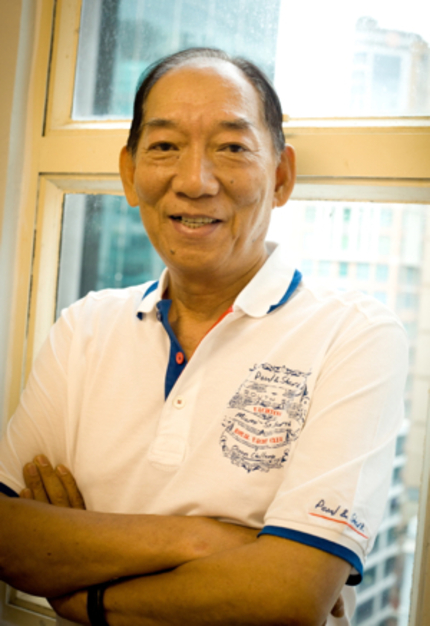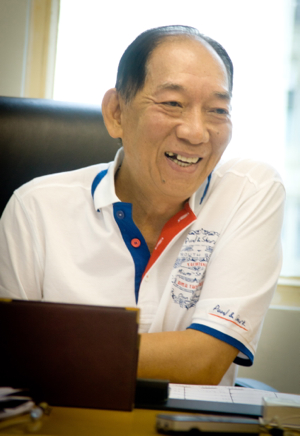Paris Cinema IFF Interview: Yuen Wo Ping on the Changing Face of Kung Fu Cinema

Late last month saw the launch of the 10th Paris Cinema International Film Festival, and a huge part of their programme was the incredible Hong Kong In Focus segment, curated in a special collaboration with the Hong Kong International Film Festival Society. The festival featured more than 80 films from the city's remarkable post-war era, and among the filmmakers and assorted luminaries flown in for the event was director and fight choreographer extraordinaire Yuen Wo Ping. Yuen introduced a special screening of his 1993 classic, Iron Monkey and also held a special master class while at the event.
Just before he jetted off to Paris, ScreenAnarchy was invited to interview the martial arts master about his career in Action Cinema, and so we began by asking him what he felt made Hong Kong movies so enduringly popular around the world?
Yuen Wo Ping - It's got a lot to do with the painstaking effort of the filmmakers in the Hong Kong industry, their drive for creativity in particular. Also Hong Kong, unlike China, is a more open system, we celebrate the freedom of speech, so that gives us the room to be more creative compared with filmmakers in the mainland.
ScreenAnarchy - They have chosen Iron Monkey to represent your work in the festival. How well does this film in particular represent your contribution to Hong Kong Cinema?
The film is nearly 20 years old now but what makes it so good is the father-son relationship, which was something quite special and innovative at that time. The way we portrayed it using a lot of action and martial arts scenes, it really made the movie stand out.
Can you be a little more specific. What do you feel you brought to this father-son story?
What I mean is the way we used action and martial arts in the film was not relating to fighting all the time, I used it to enhance the plot of the story. There's a scene where Yang and Miss Orchid are catching pieces of paper that are blowing in the air, and by using action rather than words. My intention here is to express the relationship and the feelings between these two characters. So for me action is not always about fighting, but about establishing a dynamic between different characters, and then building the action on top of that.
If you were programming this festival, which three or four films would you choose to best present your work in Hong Kong cinema?
Drunken Master would be number one, Tiger Cage at number two, Iron Monkey at number three. Tiger Cage is quite unique because it has a contemporary setting, rather than being a costume drama. Another favourite of mine is called The Miracle Fighters, but Western audiences might struggle to identify with that because it's a very Chinese story. It uses a lot of Chinese mythology, but if I made it today I would probably use a lot of CGI. But in those days - the early eighties - everything was very primitive compared with today.
In the CGI age it is much easier to make non-fighters appear like they can fight very well and is changing the role of the fight choreographer. How have you incorporated CGI into your work and how is it changing the way films are made?
CGI is definitely a good thing and we should give credit to it, but it shouldn't be used to replace fight choreography. Instead it should work the other way, we should take advantage of it. For example if there is a fight scene that an actor is unable to do, simply because of human limitations, then you can use a little CGI sparingly to polish the sequence and give some extra energy or spectacle.
Of course this is the idea, but in reality do you think the proliferation of CGI is actually having a negative impact on the action movie industry?
The way I work I won't let anything negative come out of using this technology. I understand how it can be a threat to my work but I refuse to be led by CGI. In the old days, if someone was being hit by a car, they would be attached to a wire. CGI can reduce the danger of the stuntman actually being hit. Overall it is a very positive thing. I still want the car and I still want the actor there, but I believe there's a way to make use of CGI to ensure there are no hazardous repercussions. The way I design stunts are always based on real life, but now CGI can be used to enhance that.
Is there a difference in the attitude towards CGI in China than in Hollywood? Do you find you are under more or less pressure to do it one way or the other?
Hollywood makes more use of CGI, mostly because they have larger budgets than productions in China most of the time. But I don't feel any pressure, especially in Hollywood productions, because in the first place they have made a conscious decision to hire me rather than rely on technology, but even in my work there are some things that cannot be done without CGI. Like one scene in The Matrix: Reloaded where we had a lot of people standing in a circle (the Burly Brawl). I still had real actors and stuntmen actually there doing it, but then a lot of CGI was used to enhance the scene afterwards.
I imagine these days you find yourself choreographing for non-fighters more often than before, so how have you adapted your teaching style to handle this?
The best way to get results is of course by training. Even if you cannot fight at all, you can come in and train for two months and after that you'll be quite good. This is long enough for you to look good on screen, especially if there is then going to be some CG enhancement. Any less than that and no amount of CGI can make you look good!

All the biggest martial arts stars in Hong Kong Cinema are pretty much on their way out now. Jet Li, Jackie Chan, Donnie Yen - they've only got a couple of years left in them. Who in your opinion are the best of the next generation?
For the younger generation there aren't many who have a good kung fu background. For example Shawn Yue and Eddie Peng could become real martial artists. I feel that there's no heritage for martial artists any more, there's a void that separates the two generations. I think actors today aren't mature enough to become martial artists, they have to spend a lot more time practicing kung fu, just like Donnie did. He spent at least 10 years training before he became a screen martial artist. But if they committed more time to training, then those young guys I mentioned, along with Wu Chun, they could accomplish something. Tony Leung Chiu Wai is also very good. I guarantee it. He hadn't done anything before The Grandmasters, but he trained in wing chun for two years before we even started filming. So by now he's been training for about five years!
We have seen the Ip Man story told three times in the last few years. What will we see in The Grandmasters that is different?
When I planned the fight scenes for this movie, I played them in a more rigid and tough style, more solid, with more strength. It will be very different to Donnie Yen's two movies. If I am doing the choreography I will show how you can kill someone with a single punch, rather than Donnie's style, and it's going to be very realistic - like the real thing. The action scenes are very important to project how strong the kung fu is. Also, there aren't any crazy foreigners in this version.
So is your work on The Grandmasters finished now?
No, we are still shooting. I'll be going back to the set after my trip to Paris to work on two big action sequences.
When working with a director as visually focused or as creatively protective as Wong Kar Wai, does your role as action director extend into the editing process? Or is your job over once filming has been completed?
I'll leave the editing all to the director, but on set both Wong and I know how the scene is going to look.
Is this your normal approach or just when working with Wong?
Only for Wong Kar Wai. Otherwise I give my advice and comments on how to best cut the action, and I'll sometimes sit in with the editor, if they are not used to cutting kung fu. I'll give feedback on the length and pacing of the scene in order to best show off the choreography, but also to best serve the story.
Right now you're working with Keanu Reeves and Tiger Chen on Man From Tai Chi. And I hear that Iko Uwais from The Raid is involved.
Seems like there is one character like that. I think he might be in Hong Kong actually. I have been training Keanu Reeves, and Tiger Chen and also a Westerner. Yeah and that Indonesian guy.
What do you think about this new wave of talent from South East Asia?
Everyone has their own style, just like Tony Jaa when he first broke out. His style was so different from anyone else's, so unique, taking really high risks. I think it is essential for martial artists to create their own style, as Bruce Lee did with Jeet Kun Do, to make you really stand out and the audiences love it.
Is there anyone from the West who you think is particularly good?
We can mention that guy who acted as the amnesiac agent...Matt Damon, he is pretty good. And Brad Pitt.
T - Really? But he doesn't do action roles.
But he has the potential.
Isn't he too old? He's nearly 50.
No, no problem. Jet Li is the same age.
And he keeps saying he's gonna retire...
Keanu is 40-something and his moves are still very good.
But is he getting any better?
Well...he's not getting any worse.
What, in your opinion, is Keanu hoping to achieve with The Man of Tai Chi?
I don't really know, but I feel that he's trying to become a director. That's what I have seen. I think he is going to do a good job. It's possible he'll become a master director in the future.
You must have made a strong impression on him - the fact that he has chosen a martial arts film as his first project.
No I don't think I inspired him, I think this is just where his interests lie. That's something which I feel is very important.
Do you think you will ever direct a film again?
Definitely. There are two scripts I am looking at right now. One is called Wu Dang.
What attracted you to it?
It's just a really good story. For me the script has always been the most important part of any project.
Photos by Rachael Lawson
Many thanks to Amory Hui and Mico Low for their help with the translation.

Do you feel this content is inappropriate or infringes upon your rights? Click here to report it, or see our DMCA policy.






